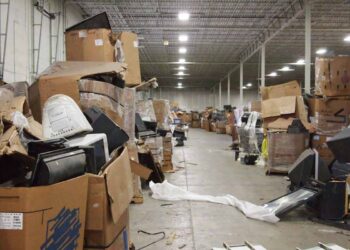Local governments don’t have to pay minimum wage or overtime to prison inmates who are sorting recyclables at MRFs, regardless of whether the recycling program financially benefits from the cheap labor, a federal judge ruled.
The June 9 decision was handed down by U.S. District Court Judge Stephanie A. Gallagher, who was ruling in a case over a publicly owned MRF in Baltimore County, Md. The Daily Record newspaper first reported the opinion.
In January 2021, Michael Scott of Essex, Md. filed a class-action lawsuit against Baltimore County, alleging the county was violating the federal Fair Labor Standards Act (FLSA) and its state law equivalent by failing to pay minimum wage and overtime when inmates worked at the county’s MRF. The lawsuit was filed in U.S. District Court in Maryland.
The county’s Community Corrections Program operates a work detail program through which inmates sort recyclables at the MRF, among other county-supervised tasks. Gallagher’s opinion noted that work assignments typically last nine to 10 hours per day, except for during the holiday season, when recyclables volumes increase and they work 11 to 12 hours a day. The inmates worked alongside temporary employees of the county getting paid minimum wage and working fewer hours.
Gallagher noted difficult working conditions, with inmates who were not provided enough food or clothing sometimes grabbing food off the conveyor belt to eat or snagging clothes that had been discarded to stay warm. Those on work detail received $20 per day, along with some opportunities and credits to reduce their remaining time served, the judge noted.
Employment or rehabilitation?
Gallagher wrote that the heart of the case was whether their work outside the walls of the prison constitutes “employment,” giving them rights under the FLSA.
She decided that it doesn’t, finding that inmate work programs either inside or outside prison walls involve a degree of control unlike typical employment relationships. It didn’t matter that the county sought to use their cheap labor to reduce costs and improve the financial results at the MRF, she wrote, or that the county had a quota for how many inmates it needed to work the MRF.
“Despite Plaintiffs’ evidence of the County’s economic motivations, the program provided structure to inmates’ days, provided inmates with work experience, provided pay (albeit very little) to inmates, and provided other benefits, such as institutional credits for time served – all of which demonstrate a rehabilitative purpose,” she wrote, adding that evidence indicated the work detail was voluntary and inmates wouldn’t have to work the MRF if they refused.
In terms of the working conditions, Gallagher noted that other courts have determined that “FLSA is not the appropriate tool to remedy a prison’s failures to meet the basic needs of its inmates.” The Constitution requires jails to provide basic needs for inmates, she wrote, but the FLSA doesn’t require those inmates be paid minimum wage or ensure they have a minimum standard of living.
An attorney for the plaintiffs told The Daily Record they plan to appeal.






























